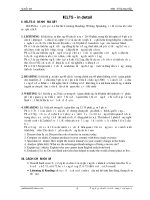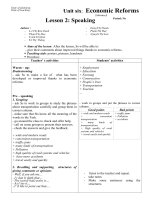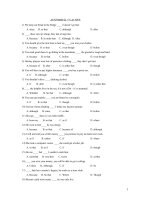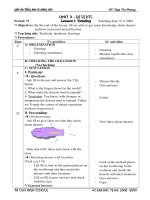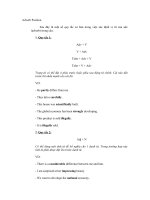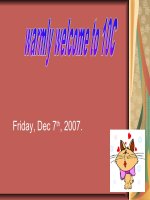adj vs adv
Bạn đang xem bản rút gọn của tài liệu. Xem và tải ngay bản đầy đủ của tài liệu tại đây (59.37 KB, 3 trang )
Common adjectives ending in -ly
There are not very many, but other common adjectives apart from costly ending in -ly include:
friendly, lively, lovely, silly, ugly, unlikely:
• It was a lively party and there were lots of very friendly people there.
He was really quite ugly and unlikely to succeed in the blind date competition.
Adverbs formed by adding -ly
As you know, most adverbs are formed by adding -ly to the adjective:
• He is a slow and careful driver.
He drives slowly and carefully.
• I'm going to give a house a thorough clean.
I'm going to thoroughly clean the house.
But note that we cannot form adverbs in this way when the adjective ends in -ly. We cannot say:
friendlily or uglily or sillily. We have to find some other way of modifying the verb, e.g.:
They greeted us in a very friendly / silly manner.
Adjective and adverb with the same form
A number of adverbs have the same form as adjectives. The most common include: hard, fast,
straight, early:
• I know he has a fast car, but he doesn't need to drive so fast.
• It's hard work, but if you work hard and really concentrate, you'll finish it by bedtime.
• I caught the early bus to be sure of arriving early.
The Aurelian Way is a very straight Roman road which goes straight from Rome to Pisa.
Adverbs with two forms
Some adverbs have two forms. Sometimes there is a difference in meaning. Sometimes there is not
very much difference. Compare the following:
• I haven't seen very much of you lately (lately = recently).
• You always seem to come home late from work.(late = arriving after the expected time)
• Mary can jump really high on the trampoline( tam bat).(high = vertical distance)
• Yesterday she jumped right off it. It was highly amusing. (highly = very)
• Alfonso can eat free in the restaurant where he works. (free = without paying)
• You can speak freely. Nobody can hear us. (freely = without feeling restricted)
• Can you please be waiting for me outside at nine o' clock sharp? (sharp = punctually)(dungh
• I thought she spoke to him rather sharply. (sharply = in a harsh tone)
• Don't talk so loud. Everybody in the room can hear you. (loud = informal usage)
Jonathan spoke loudly and convincingly about the advantages of leasing rather than buying cars.
(loudly = more formal usage)
little / few and a little / a few
Little is used with uncountable and few is used with countable nouns. When we use few and little
without the indefinite article, they usually have a negative meaning, but when we use them with the
indefinite article, a little or a few, they have a more positive meaning. Compare the following:
• I have few friends in England and I feel quite lonely.
• I have a few friends in England, so I don't miss home so much.
• I have little interest in classical music. I much prefer pop.
• I have a little wine in the cellar. Would you like some?
Rather than little or few, we sometimes prefer to use a negative construction with much or many in
conversational English, as it sounds slightly less formal:
• He has little money. > He doesn't have very much money.
She had few friends. > She didn't have many friends.
a little / a bit
A little, a bit and a little bit are often used as adverbs in colloquial British English with little or no
difference in meaning. Compare the following:
• You're driving too fast. Could you please drive a little (bit) more slowly?
• It was a long journey and I was feeling a bit / a little (bit) tired.
Bit can also combine with of before nouns to suggest a limited amount of something. Compare the
following:
• Let me give you a bit of advice. Don't drive so fast in built-up areas.
• I'm not very hungry after the journey. I'll just have a bit of bread and cheese.
• I've got a bit of a problem. The car has overheated, so we'll have to wait for it to cool down.
If we use it with a determiner or pronoun, little can also be used in this way:
• Would you like to try a bit of this / a little of this very sweet dessert?
I'd love a bit of your / a little of your apple and walnut cake. It looks and smells delicious.
fewer / less
Fewer and less are the comparative forms of few and little and are used with countable and
uncountable nouns, respectively. Compare the following:
• I've got a little (bit of) money in the bank. Not very much. Less than I had last year.
• The weather was awful and fewer children took part in the procession this year.
too much / too many
Much and many can be used as an alternative to a lot of. Much is used with singular nouns and
many is used with plural nouns. They can be used without nouns if the meaning is clear. Too
expresses the idea of more than enough or more than necessary. Compare the following:
• There were many / a lot of people in the dining room, but there wasn't very much / a lot of
food left on the breakfast buffet tables.
• I haven't eaten very much! ~ You've eaten far too much in my view. Much too much.
Less is used with uncountable nouns, like money or work or travel, and fewer is used with countable
plural nouns, like coins or jobs or trips. Less is the comparative form of little and fewer is the
comparative form of few. Compare the following:
• I have less work now than I had this time last year.
There are simply fewer jobs around that I am suitable for.
I therefore have little money and few friends.
Another, more common, way of saying less is not as much and another, more common, way of saying
fewer is not as many. Similarly little would translate as not much and few would translate as not
many. Compare the following.
• My new car doesn't use as much petrol as my old one so it's more economical.
• My new car uses less petrol than my old one so it's more economical.
• You don't see as many Peugeot 405s on the road now as you used to.
• You see fewer Peugeot 405s on the road now than you used to.
• I don't have much need to use my car in town when public transport is so good.
• I have to admit that there are few occasions when I walk anywhere nowadays.
Note that all of these uses have negative implications. If we want to be positive about something, we
would use a little or a little bit of or a few. Compare the following
• I can't go out in such weather, but I have a little bit of food in the house so I shall be OK.
• I can't go out in such weather and I have little food in the house so I'm quite worried.
• A few of my colleagues turned up for my presentation, so I was quite pleased.
• Few of my colleagues turned up for my presentation, so I was quite upset.
